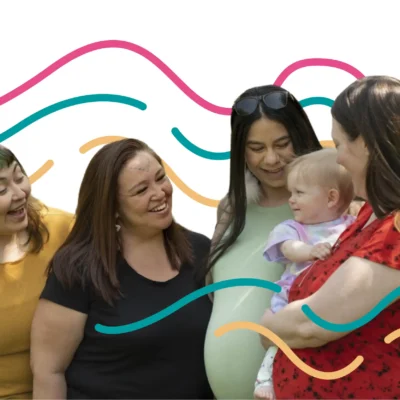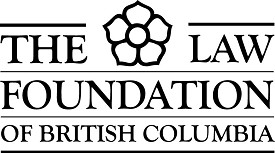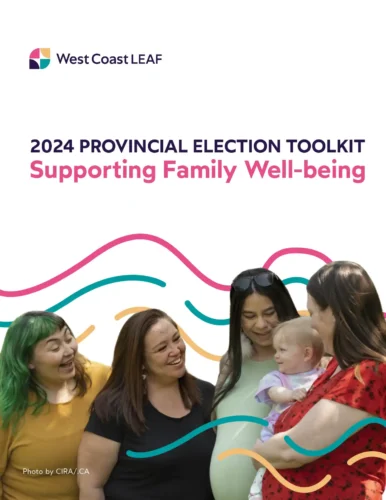
2024 Provincial Election Toolkit— Supporting Family Well-being

About this toolkit
Destruction of families is a form of genocide.
—Elder Tom, Member of Keeping Families Together
Every day in BC, families live in fear of being torn apart by child apprehensions. Colonial intrusions into the lives of Indigenous families continue to cause deep intergenerational harms.
The 2024 provincial election is a chance to push politicians to commit to meaningful changes for child and family well-being. Together, we are demanding government action to support families, and to resource Indigenous Nations and communities so they can care for children according to their traditions and practices.
Whether or not you are eligible to vote, you can use this toolkit to inform your conversations with candidates, parties, and the people in your life. This toolkit includes everything you need to make family well-being an election priority: an overview of the issues, talking points and questions for candidates, tips for engaging with candidates, a letter template, and information about voting.
This toolkit was created by West Coast LEAF in collaboration with the Family Well-being Coalition. West Coast LEAF is a legal non-profit that uses various strategies to advance gender justice in BC. The Family Well-being Coalition, hosted by West Coast LEAF, is a network of impacted people and other advocates who are pressing to transform systems so that families are supported and not policed.
The government says its laws, policies, and practices are meant to keep BC’s children safe. In reality, children and their caregivers are suffering because of the constant, terrifying threat that they will be separated by BC’s Ministry of Children and Family Development (MCFD). Apprehensions are inherently traumatizing to children and sever crucial community and cultural connections. That’s why we reject the terms “child welfare system” and “family protection system” and use the more honest term “family policing system.”
The family policing system uses surveillance to exercise power and control over the lives of marginalized families and children. MCFD’s so called “assessments” and “check-ins” are intensely stressful and far from objective. Families are punished for the BC government’s failure to prevent poverty, provide safe and affordable housing, and ensure harm reduction supports for substance use.
Families know what they need to thrive. But instead of listening to families and responding to their needs, MCFD blames and judges them for surviving under systemic injustices like racism and poverty. If families ask for support, they face the constant danger that their children will be taken away at a moment’s notice.
“Nobody is looking at the system as a whole or at the workers who are creating harm—spiritual, physical, emotional, mental, medical—and proven intergenerational impacts.”
–Elder Lorelei, Member of Keeping Families Together
Taking children away has always been a tool of colonization to undermine Indigenous families and communities and their relationships with land. It didn’t end with residential schools. The government continues to tear Indigenous families apart and interfere paternalistically in their lives.
This provincial election, we’re calling on candidates to take a stand: Stop tearing families apart and start supporting them. We use the term “child and family well-being system” to name what we are calling for in place of the family policing system. A child and family well-being system would resource and support children, youth, families, communities, and Nations to thrive according to their own wholistic understanding of well-being.
Use our questions and letter template to demand candidates make concrete commitments for child and family well-being.
We are asking provincial parties and candidates to commit to these actions:
- Direct funding to Indigenous Nations and communities so that Indigenous families can finally get their needs met according to their own traditions and practices.
- Fully resource and support families struggling with poverty.
- End the harmful and discriminatory practice of involuntary drug testing of parents.
- End the routine surveillance of Indigenous kinship caregivers.
- Give families access to Elders and trained and independent community-based support workers to help them navigate the system and uphold their rights.
Talking points and questions for candidates
“The colonial system has no legal right whatsoever to interfere with Indigenous kids. Get your hands off our kids.”
—Elder Lorelei, Member of Keeping Families Together
Family policing is a continuing form of colonial violence. It ripples across communities, causing catastrophic cultural and intergenerational harm to children, parents, families, and Nations. Self-determination can’t truly be achieved when the colonial state continues to remove children from their communities and Nations.
Indigenous peoples have inherent jurisdiction over their communities, families, and children. The federal Act respecting First Nations, Inuit and Métis children, youth and families (Bill C-92) is supposed to create a pathway for Indigenous Nations to assume their rightful jurisdiction over family well-being, but many Nations lack the funding and resources to implement the law.
What needs to change?
The BC government must resource Indigenous Nations and communities to care for their families as only they can: in alignment with their cultures, practices, values, and knowledge. Indigenous families must be able to steward resources in a way that maintains their self-determination, autonomy, and healing.
Questions for candidates
- If elected, how will your party resource Indigenous Nations and communities so Indigenous families can finally get their needs met according to their own traditions and practices?
- How will you act on the many recommendations that have called for MCFD to take accountability for the colonial violence it perpetuates?
“We would be much better off to bring supports into the family’s home rather than foster parents. We need to actually help people get out of poverty, help pay a hydro bill. Why are we not just paying it?”
– Lori, Member of Keeping Families Together
The BC government exacerbates poverty through its policies, such as its failure to provide transitional and affordable housing and inadequate income and disability rates. Simultaneously, MCFD punishes families who are struggling to make ends meet. Rather than continuing to pour hundreds of millions of dollars into the harmful system of family policing and child apprehensions, the government must meet families’ material needs and take bold action against poverty and classism.
What needs to change?
BC must raise the rates for income assistance, disability benefits, and minimum wage to reflect the true cost of living. Rather than punishing families for systemic problems like the housing crisis, the BC government must ensure universal access to safe, high-quality, and affordable homes. “Social condition” must be added to the Human Rights Code to provide legal protection from discrimination based on socio-economic status, including living in poverty or being unhoused.
“Families don’t get the payments and supports that foster families get – nowhere near.”
-Elder Lorelei, Member of Keeping Families Together
Questions for candidates
- If elected, how will your party address the gap between the cost of living and rates for income assistance, disability benefits, and minimum wage?
- Does your party commit to tying assistance and benefit rates to inflation so that families are not falling further behind as the cost of living increases?
- How will your party ensure access to safe, high-quality, and affordable housing?
- Will you add social condition to the Human Rights Code?
We need to “reconstruct what is a true family. Families of past in community had child, parents, grandparents, uncles, and aunties. There were five levels of care and community. We need that intimate family connection.”
—Elder Tom, Member of Keeping Families Together
Kinship care is critical to keeping families and communities together. It includes grandparents, aunts, cousins, and other extended family and community members caring for children. Kinship care allows Indigenous children to maintain community and cultural ties and offers an alternative to government care.
Kinship caregivers often enter Extended Family Program Agreements to support the transition of children into their home. These agreements are a way for kinship families to access supports to raise children who come under their care.
Without consulting with the community in any meaningful way, MCFD changed its Out-of-Care Policy to increase surveillance of kinship care families. The policy now mandates invasive visits to caregivers’ homes every 90 days. This increased interference by MCFD will disrupt children’s lives, cause unnecessary stress and trauma, and potentially discourage caregivers from entering kinship care arrangements.
What needs to change?
MCFD’s latest harmful policy change to kinship care needs to be immediately suspended. This election, call on candidates to stop surveilling kinship caregivers and support them instead.
Questions for candidates
- If elected, will you immediately suspend recent policy changes that increase the surveillance of kinship caregivers and their families?
- How much money has your party committed to supporting kinship caregivers?
“Safety means a supportive environment. The first line of defense should never be removal.”
—Rachel, Member of Keeping Families Together
There is a massive power imbalance between MCFD and parents and caregivers who are in danger of having their children removed. This power imbalance is magnified by entrenched colonialism, ableism, racism, misogyny, and classism. As families struggle to protect their children and keep their families intact, they are forced to navigate a complicated system that lacks accountability and transparency. MCFD’s actions create a disturbing reality where reaching out for support may lead to your children taken away from you.
What needs to change?
Families should never be forced to go it alone. They need access to Elders and trained, independent community-based advocates to help them uphold their rights and navigate the system. These advocates should help families assert their rights and access supports in a collaborative, trauma-informed, and culturally safe way.
Questions for candidates
- How will your party address the lack of supports for families to navigate the family policing system and uphold their rights?
- If elected, will your party resource families’ access to Elders and trained, independent community-based advocates?
“The system doesn’t give people a chance. Get to know your neighbour. Do not judge. Drugs do not make you bad, it is the system.”
—Rachel, Member of Keeping Families Together
Parents dealing with the family policing system are often forced to undergo intrusive and discriminatory drug testing. Because of racism and classism, Indigenous, Black, and low-income parents are disproportionately targeted for these tests.
Drug tests cannot accurately assess parenting capacity, drug use, or children’s safety. Numerous studies have established that a positive drug test does not prove that a drug is present in the person’s body.
Amid an ongoing drug toxicity crisis, parents who use substances are disproportionately targeted for child apprehensions, and parents whose children are removed are at an increased risk of overdose due to the trauma of removal.
Families live in fear of child apprehensions triggered by needless drug tests.
What needs to change?
Families should never have their kids removed due to discriminatory and unfounded assumptions about substance use. Involuntary drug testing is rooted in stigma against people who use substances and must end.
Any policies that impact parents who use substances should be developed in collaboration with them, informed by their lived experience.
Questions for candidates
- If elected, will your party commit to ending MCFD’s practice of involuntary drug testing?
- How will you collaborate with parents who use substances to develop policies and practices that respect their autonomy and dignity?
- How will you challenge stigma and discrimination against people who use substances, in public institutions and throughout society?
Engaging with candidates
The list of candidates will be finalized after nominations close on September 28.
- Write to parties and candidates using the letter template in the next section of this toolkit. Or write your own letter, which may have more impact than a template letter.
- Phone candidates or message them on social media.
- Request meetings with candidates and use this toolkit to guide the conversation.
- Attend all-candidates forums and ask questions. It can help to get in line early to ask your question or submit your question in advance if possible.
- Be prepared for party canvassers coming to your door. Use this toolkit to inform your conversations with them.
- Introduce yourself and share why child and family well-being matters to you personally.
- Repeat your question if the person you are speaking with changes the subject. It is common for candidates and party representatives to redirect to their prepared talking points when asked challenging questions.
- Ask others to join you in contacting candidates and parties or asking questions at an all-candidates forum.
Find candidates in your district and send them this template letter to demand that they prioritize family well-being this election. You can also use our template email.
Dear [Candidate’s Name],
Families belong together and deserve support to thrive. Like many BC residents, I consider child and family well-being a top priority in the upcoming provincial election.
Every day, families live in fear of being torn apart by child apprehensions. Colonial interference in the lives of Indigenous families causes ongoing trauma that ripples across communities. The BC government must take accountability for policies and practices that continue to cause catastrophic cultural and intergenerational harms to children, parents, families, and Indigenous Nations.
This provincial election, you have an opportunity to commit to meaningful, transformative change for child and family well-being. I ask you to act now and commit to:
- Directing funding to Indigenous Nations and communities so that Indigenous families can finally get their needs met according to their own traditions and practices.
- Fully resourcing and supporting families struggling with poverty, instead of tearing them apart.
- Ending the harmful and discriminatory practice of involuntary drug testing of parents.
- Ending the routine surveillance of Indigenous kinship caregivers.
- Giving families access to Elders and trained and independent community-based support workers to help them navigate the system and uphold their rights.
If you are elected, I hope you will carry forward these urgent policy asks and truly support families. Families know what they need to thrive: our government needs to listen and act.
Sincerely,
[Your name]
[Your electoral district/address]
Voting information
- October 7: Last day for online and telephone voter registration (note: you can still vote even if you have not registered ahead of time)
- October 10-13 and 15-16: Advance voting, 8 am to 8 pm
- October 13: Last day to request a vote-by-mail package online or by telephone
- October 19: Final voting, 8 am to 8 pm
You can vote if you meet all these requirements:
- You have Canadian citizenship,
- You are 18 or older on October 19, 2024, and
- You have been living in BC since April 18, 2024 (or longer).
You can choose how to vote:
- At any district electoral office,
- By mail,
- At advance polls on October 10-13 and 15-16, or
- On the final voting day, October 19.
You can vote by phone if you cannot vote in one of the ways listed above (for example, because of your accessibility needs, or because you need to self-isolate). Call 1-800-661-8683 to find out if you can vote by phone.
Find out more about the voting options.
Voters must prove their identity and where they live. Find out the requirements for showing ID or having another person vouch for you.
There have been changes to the district boundaries since the last provincial election. Look up your district.
You can vote at any voting place. It doesn’t have to be near where you live. Find voting places.
When voting in person, you can ask for help to mark the ballot for any reason. Or a friend or family member can help you mark the ballot if they declare that they will follow your wishes.
Voting places should have audio recordings of candidate lists, uncontracted Braille candidate lists, Braille ballot templates, and large-print ballots. You can bring your own assistive devices. You can also bring a translator or interpreter, who must declare that they are able to act as a translator or interpreter and will do the best job they can.
All advance voting places and most general voting places should be physically accessible for people using mobility devices. If the voting place has an access barrier, you can vote outside the building.
With few exceptions, voters have a legal right to a four-hour period free from work during advance voting or on the final voting day (8 am to 8 pm). Employers are not allowed to penalize you or reduce your pay for taking time off to vote.
After the election
Beyond the election, we need to keep the pressure on politicians to act for child and family well-being.
Representatives will get access to their offices after they are appointed in writing on November 5, 2024. Contact your local MLA to encourage them to enact the policy changes we’ve outlined in this toolkit.
To keep your MLA accountable, call or meet with them to ask them how they intend to truly support families now that they are in office.
Acknowledgements
Our sincere thanks to the members of the Family Well-being Coalition who made this toolkit possible. Deep gratitude to Keeping Families Together for sharing their voices in the toolkit.
This toolkit was made possible by generous funding from the Law Foundation of BC.

